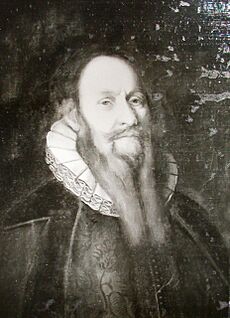Laurentius Paulinus Gothus facts for kids
Quick facts for kids The Most Reverend Laurentius Paulinus Gothus |
|
|---|---|
| Archbishop of Uppsala Primate of Sweden |
|
 |
|
| Church | Church of Sweden |
| Archdiocese | Uppsala |
| Appointed | 1637 |
| In Office | 1637–1646 |
| Predecessor | Petrus Kenicius |
| Successor | Johannes Canuti Lenaeus |
| Orders | |
| Consecration | 3 August 1608 by Olaus Martini |
| Rank | Metropolitan Archbishop |
| Personal details | |
| Born | 10 November 1565 Söderköping, Sweden |
| Died | 29 November 1646 (aged 81) Uppsala, Sweden |
| Buried | Strängnäs Cathedral |
| Nationality | Swede |
| Parents | Påvel Pedersson Karin Pedersdotter |
| Spouse | Catharina Olofsdotter (Till 1623) Brita Eriksdotter |
| Previous post | Bishop of Skara (1608–1609) Bishop of Strängnäs (1609–1637) |
| Alma mater | Uppsala University |
Laurentius Paulinus Gothus was an important Swedish thinker who lived a long time ago (from 1565 to 1646). He was a theologian (someone who studies religion), an astronomer (someone who studies stars and planets), and eventually became the Archbishop of Uppsala, which is like the main leader of the Church of Sweden.
Contents
Laurentius Paulinus Gothus: His Life Story
Laurentius was born Lars Paulsson in Söderköping, Sweden. When he was 23, he traveled to Germany and studied at Rostock University for three years. He was interested in the ideas of a philosopher named Pierre de la Ramée.
Early Career at Uppsala University
After getting his Master's degree, he came back to Uppsala in 1593. This was an important time because the Uppsala Synod was happening, where the main beliefs of the Church of Sweden were decided. He became a professor of logic at Uppsala University, which had just reopened with a focus on the Lutheran faith. Later, in 1598, he switched to being a professor of astronomy.
A Comet and a King
For a while, Laurentius and some other professors were suspended from their jobs. This happened because of political issues with the king at the time. However, in 1604, his Protestant uncle, Charles IX of Sweden, became king.
In 1607, a comet appeared in the sky. People back then often believed that comets and other heavenly signs had special meanings. Laurentius said he could explain what the comet meant. His interpretations impressed King Charles, and Laurentius was given his job back at the university.
Debates and Beliefs
Laurentius strongly believed in a way of thinking called Ramism, which he learned from the writings of Petrus Ramus. He often debated his ideas with other thinkers. One famous debate was with Jonas Magni Wexionensis, who was also a professor at Uppsala University and followed the ideas of an older philosopher named Aristotle.
Becoming a Bishop and Archbishop
Laurentius served as a bishop in different parts of Sweden. First, he was the Bishop of the Diocese of Skara from 1608 to 1609. Then, he became the Bishop of the Diocese of Strängnäs from 1609 to 1637.
In 1628, he was asked to investigate a woman named Margareta i Kumla, who claimed to have visions and meet with angels and demons. Bishop Gothus described her visions at a meeting of Swedish church leaders in 1629.
During the time of Christina, Queen of Sweden, Laurentius Paulinus Gothus became the Archbishop of Uppsala and the main leader of the Church of Sweden. He held this important position from 1637 until he passed away in 1646.
Laurentius Paulinus Gothus: His Writings
Laurentius Paulinus Gothus wrote many books and papers. He wrote about theology (religious studies) and astronomy. He also published calendars.
One of his most important works was a large book called Ethica Christiana (Christian Ethics), which he wrote between 1615 and 1630. It was published in six parts in Swedish and explained the Lutheran faith. In 1631, he wrote a shorter version of this work. This summary is considered a very important book for teaching about the Christian faith in 17th-century Sweden. He also wrote some books about Swedish history.
 | Janet Taylor Pickett |
 | Synthia Saint James |
 | Howardena Pindell |
 | Faith Ringgold |

